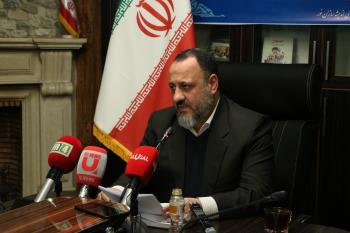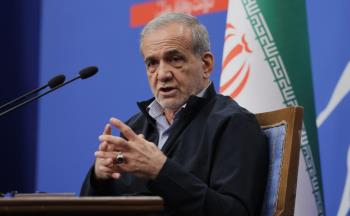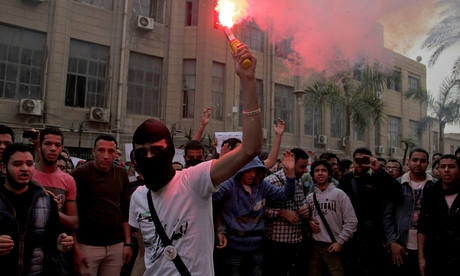Alwaght - Adly Mansour and now Abdel Fatah al-Sisi are ruling by decrees, banning protest and severely curbing freedom of speech.
Egypt is enacting authoritarian laws at a rate unmatched by any regime for 60 years, the Guardian reported.
Since the overthrow of Mohamed Morsi in July 2013, Morsi’s successors in the presidency, Adly Mansour and Abdel Fatah al-Sisi, have used the absence of an elected parliament to almost unilaterally issue a series of draconian decrees that severely restrict freedom of expression, association and assembly.
The speed at which the decrees have been issued outpaces legislative frenzies under the dictators Anwar Sadat and Hosni Mubarak, and is matched only by the period that followed the toppling of the Egyptian monarchy in 1952, according to Amr Shalakany, associate law professor at the American University in Cairo; Amr Abdulrahman, director of civil liberties at the Egyptian Initiative for Personal Rights; Mohamed Elhelw, head of legal research at the Egyptian Commission for Rights and Freedoms; and Ahmed Ezzat, a human rights lawyer, and previously a legal researcher at another prominent rights group.
“This is not normal,” said Shalakany. “Historically, it’s completely out of pattern with any normal legislation that we’ve had experience of in this country.” The only precedent, Shalakany said, was set by the Revolutionary Command Council of the early 1950s. “The rate is faster than even the last year of Sadat’s [tenure, 1981]; the scope is also wider.”
Legislation enacted by Mansour, an interim president installed by Sisi after Morsi’s removal, and Sisi himself, a former army chief elected to succeed Mansour, include laws that ban protest, expand the jurisdiction of military courts, remove several limits on pre-trial detention, and restrict media coverage of the armed forces without prior approval.
Most troublingly, the moves have been made without the involvement of parliament, and with only the nominal oversight of a cabinet and a committee over which Sisi has overbearing influence.
“Sadat and Mubarak did not use their capacity to issue controversial legislation in the absence of parliament to nearly the same extent as Sisi is doing now,” said Abdulrahman. “These are crucial decrees that relate to different spheres of economic and social life that passed without any kind of national dialogue.”
According to a roadmap drawn up after the overthrow of Morsi, who was himself accused of draconian measures, a parliament should have been elected by the end of 2013. Revisions to the roadmap then pushed back elections until July 2014. But despite the speed at which other laws have been passed, a second law needed to set elections in motion still has not been finalized, meaning Egypt may not have an elected legislature until summer 2015.
Sisi and Mansour have filled the vacuum with controversial decisions well beyond their constitutional remit. “The constitution gives the president the right to issue decrees in exceptional situations, out of necessity,” said Elhelw. “But the laws they have issued are not absolutely necessary. If they weren’t issued, the state would not stop.”
The surge of authoritarian legislation includes, in chronological order:
Supporters of the ousted president Mohamed Morsi clash with security forces near Cairo University earlier this year.



























